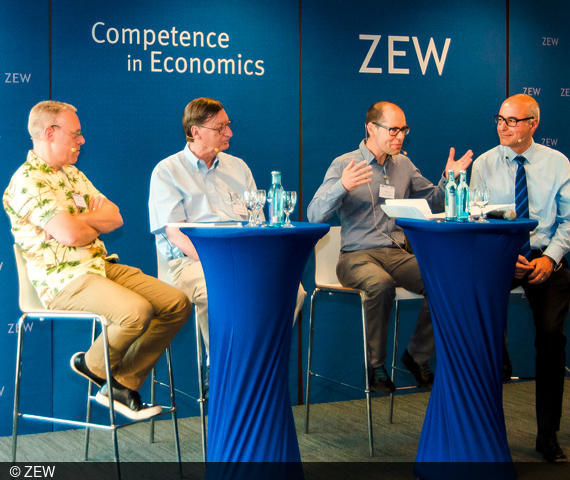First-Hand Information on Economic Policy – Data Is a Growth Factor
Public EventsThe phenomenon of the data economy comes with a number of opportunities, challenges and risks. As the process of digitalisation advances and more and more data is made available and processed online, what consequences could arise with respect to market power, consumer protection, copyright laws and other regulations? Which changes are to be expected in the new data economy with regard to the relationship between individuals and large companies?
These are some of the questions that were discussed at the panel discussion which took place following the lecture given by Professor Hal Varian at the Centre for European Economic Research (ZEW) in Mannheim on 23 June 2017. The talk was part of ZEW’s lecture series First-Hand Information on Economic Policy.
Google chief economist and US academic Professor Hal Varian was joined on the podium by ZEW President Achim Wambach and Professor Steven Tadelis, Vice President of Economics and Market Design at the US online retail giant Amazon and professor at the University of California, Berkeley. The panel discussion was moderated by Martin Peitz, professor of applied economics at the University of Mannheim and one of the directors of the Mannheim Centre for Competition and Innovation (MaCCI), a joint initiative of ZEW and the University of Mannheim. At the beginning of the discussion, Peitz asked the panellists about the major challenges we as a society will have to overcome in the coming years, if data comes to play an increasingly important role in value-added processes.
“Data is a growth factor,” said Tadelis, emphasising the importance of digital transformation, “above all, the healthcare sector is likely to undergo significant changes.” In this respect, demographic change is likely to have a considerable impact on this development. He went on to explain that despite recent controversial debates, there is no justification to create panic over the collection of patient information in the healthcare sector. “Thanks to the process of modernisation over the past one hundred to two hundred years, our standard of living has reached a very high level by historical standards,” said Tadelis, who emphasised that he was participating in the discussion as an economist and not as an Amazon representative. When it comes to predicting future developments, explained Tadelis, historical comparison might be the best approach.
Digitalisation is changing job descriptions without destroying jobs
ZEW President Achim Wambach pointed out that the informative value of this approach greatly depends upon the time period in question. “One hundred years ago, the working population was afraid that technological progress might destroy their jobs.” Today more than ever, workers need to remain flexible with regard to the upcoming technological change. It is, however, necessary to differentiate.
A study conducted by researchers Carl Benedikt Frey and Michael A. Osborne has shown that 47 per cent of workers in the US and 42 per cent of workers in Germany are at risk of losing their jobs in the next 10 to 20 years as a result of the automation of certain work tasks. By contrast, ZEW researchers came to the conclusion that digitalisation is in fact changing job descriptions, which does not necessarily mean that digitalisation will destroy jobs, explained Wambach. According to the study, only nine per cent of jobs in the US and twelve per cent of jobs in Germany have job profiles that are at a relatively high risk of automation. “On the positive side, however, this change is likely to provide more room for creativity at the workplace,” said Wambach. There is, however, no denying that some workers might lose out due to digitalisation. With regard to this issue, Martin Peitz asked the panellists which workers were likely to be the losers of digitalisation.
Man versus machine
At this point in the discussion, Hal Varian intervened. “Even the simplest tasks carried out by workers are almost impossible for robots to perform,” he said, giving apple picking as an example. Artificial intelligence systems do not have haptic capabilities and can therefore not perceive apples in the same way that humans can. In robotics, haptic technology continues to represent a challenge. In the medium or the long term, it is likely that employees in the low-wage sector will even experience income increases.
The audience contributed their own questions after the panel discussion, such as: Do we need some form of data taxation in the new data economy? How can we improve the conditions for data investments in businesses? Is it necessary to introduce a universal basic income in light of the automation of the working world? And if technological change does in fact destroy jobs, how can we address future challenges associated with declining productivity growth? The panel discussion proved that the new data economy raises many questions that are yet to be discussed.
